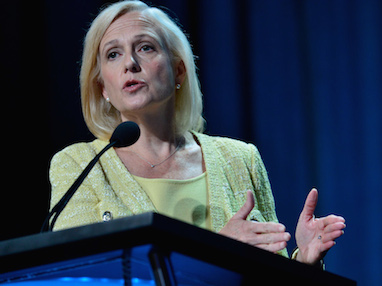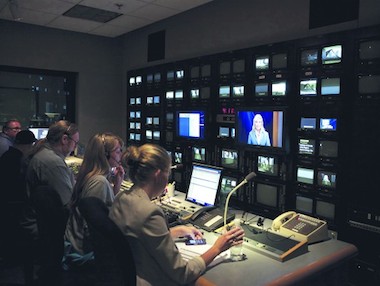Nice Above Fold - Page 386
Thursday roundup: White House honors Rehm and Tippett; Ira Glass's favorite tools
Plus: AIR releases a Kickstarter tutorial, and a small Washington state community approves public access TV.Madison Hodges, longtime station manager and pubradio advocate, dies at 66
Madison Hodges, a longtime manager of public radio stations and advocate for the system who worked to increase the community impact of pubcasters nationwide, died July 18 in Tallahassee, Fla., from cardiac arrest following treatment of a rare bone cancer. He was 66. Hodges ran several university-licensed public radio stations over the course of his career and served as executive director of the University Station Alliance. He also oversaw station services at NPR and spearheaded initiatives with the Public Telecommunications Facilities Program to increase community involvement, help licensees secure CPB funding, identify gaps in public radio’s coverage and quantify stations’ community impact for license-holders.Popularity of 'Downton' creates embarrassment of riches in 'Masterpiece' slot
BEVERLY HILLS, Calif. — The success of Downton Abbey, whose fifth season has been set for Jan. 4, has created a novel problem for PBS: too many programs to fit into the Sunday-night slot occupied by Masterpiece. It’s possible that PBS might schedule some of the excess series at another hour or on another day. But there are no plans to do so for now, according to Masterpiece EP Rebecca Eaton. “We have been working with PBS to figure out what to do with all this programming because we are bursting the banks of Masterpiece Sunday nights at 9 o’clock,” she said.
With on-demand streaming, PBS will enable premiere-week bingeing on Burns's Roosevelts
In a session with TV critics, PBS's Kerger said the streaming experiment will "accommodate a wide range of viewing habits."Wednesday roundup: WAMU revises schedule; pubcasters enter Mass. hall of fame
Plus: A Mississippi reporter discusses his difficult past, and Carl Kasell assists with a marriage proposal.In spectrum auction, FCC should protect public TV's coverage
The FCC recently released the entire text of its Report and Order detailing rules for the upcoming broadcast spectrum auctions, making it clear that it intends to make no effort to preserve public TV signal coverage. The 484-page report, “Expanding the Economic and Innovation Opportunities of Spectrum Through Incentive Auctions,” rejects the proposal supported by CPB and other leading broadcast organizations to preserve at least one station per geographic market. If you dive into this ponderous document, I recommend paragraph 367 and footnote 1090 (unfortunately, not a typo — there really are over 1,000 footnotes). In paragraph 367, the FCC states that it declines to “restrict acceptance of such bids based on the potential loss of television service or specific programming.”
PBS leads networks in news Emmy nominations
PBS’s 43 nominations for News and Documentary Emmys topped all networks. Its programs will compete against each other in many categories. In some categories, including those for outstanding investigative journalism, best documentary and coverage of a current event, PBS earned more than half of the nominations. Frontline, the documentary series produced by WGBH in Boston, led with 11 nominations, including three of the six nominations for investigative reporting. Those went to “A Death in St. Augustine,” “League of Denial: The NFL’s Concussion Crisis” and “Rape in the Fields,” a co-production of Frontline and the Center for Investigative Reporting.PBS press tour highlights Downton, Nas on Finding Your Roots
The stars of Downton Abbey aren’t the only luminaries whom journalists will chat with during PBS’s portion of the Television Critics Association Summer Press Tour today and Wednesday. Other big names at the Beverly Hilton in Beverly Hills, Calif., include rapper and songwriter Nas, director Spike Lee, Oscar winner Geena Davis, actor Nathan Lane and television legend Dick Cavett. The twice-yearly tour is a chance for broadcasters to woo more than 200 reporters with news of their upcoming schedules, deploying sizzle reels, high-profile appearances, question-and-answer sessions and, of course, food and drinks. PBS President Paula Kerger will greet journalists during her executive session at 10 a.m.Tuesday roundup: Rosen fires back on ombud debate; new podcast app hits Apple store
Plus: Beat Making Lab returns to PBS Digital Studios, and John Oliver joins Muppet-like creatures to sing about prisons.BBC cuts hundreds of jobs, increases funding for World Service
The pubcaster is restructuring its news division, with little effect on programs airing on stateside pubmedia.As newsrooms expand, employees at several stations push to unionize
Public media employees have increasingly sought to organize unions during the past two years, spurred by expanding newsrooms, shifting management priorities and a desire for more influence in strategic planning.Monday roundup: Reveal will go weekly; Al Letson pens comic book
Plus: Roger Ebert's hand-picked protege on why PBS's At the Movies reboot failed.New digital offerings from NPR, PBS promise closer look at how users consume content
New digital offerings from NPR and PBS aim to give public media additional platforms for building online audiences while gaining insights into how listeners and viewers interact with digital content. These digital initiatives — PBS’s Membership Video on Demand service and NPR’s long-awaited NPR One app — were demonstrated and discussed during the Public Media Development & Marketing Conference in Denver July 9-12. The frequent name-changes for NPR’s mobile app during its development — it has been variously referred to as “Project Carbon,” “Infinite Player” and “MPX” — prompted laughter among PMDMC attendees when recounted by Zach Brand, NPR’s v.p. of digital media.New York Public Radio, StoryCorps among 2014 Knight Prototype grantees
A rejiggered phone booth from New York Public Radio, a mobile app produced by StoryCorps and a public-records data tool from the founder of FOIA Machine are among the 16 recipients of grants from this year’s Knight Foundation Prototype Fund. The foundation’s annual contest awards six-month, $35,000 grants to help recipients develop early-stage media ideas. Winners were announced Thursday. “While six months and a $35,000 grant might not always be enough to finish version one of a project, it can go a long way towards validating an assumption, developing a minimum viable product or identifying a need to revise an approach,” Chris Barr, a media innovation associate with Knight, wrote in a release.After criticism, NPR gives freer rein to upcoming ombudsman
NPR has stepped back from plans to curtail its ombudsman’s duties after receiving criticism from journalists and leaders of its member stations. The blowback began with a blog post by New York University journalism professor Jay Rosen, who pointed out Monday that a job posting for NPR’s next ombudsman specified that the in-house watchdog should refrain from “commentary” and “judgment.” Edward Schumacher-Matos, NPR’s current ombudsman, will end his three-year term in September. Rosen saw the change in language as an effort to defang the ombudsman, which he argued would remove a valuable check on NPR’s reporting. Some station leaders noted Rosen’s post and shared his concerns.
Featured Jobs




